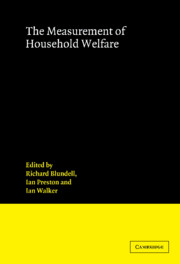Book contents
- Frontmatter
- Contents
- List of contributors
- 1 An introduction to applied welfare analysis
- 2 Measuring the cost of children: a theoretical framework
- 3 The collective approach to household behaviour
- 4 Ordinal and cardinal utility: an integration of the two dimensions of the welfare concept
- 5 The determination of welfare in nonintact families
- 6 Female labour supply, housework and family welfare
- 7 Engel equivalence scales in Sri Lanka: exactness, specification, measurement error
- 8 Measuring the life-cycle consumption costs of children
- 9 Family fortunes in the 1970s and 1980s
- 10 Ethically-consistent welfare prescriptions are reference price-independent
- 11 The effect of systematic misperception of income on the subjective poverty line
- Index of names
- Index of subjects
10 - Ethically-consistent welfare prescriptions are reference price-independent
Published online by Cambridge University Press: 13 January 2010
- Frontmatter
- Contents
- List of contributors
- 1 An introduction to applied welfare analysis
- 2 Measuring the cost of children: a theoretical framework
- 3 The collective approach to household behaviour
- 4 Ordinal and cardinal utility: an integration of the two dimensions of the welfare concept
- 5 The determination of welfare in nonintact families
- 6 Female labour supply, housework and family welfare
- 7 Engel equivalence scales in Sri Lanka: exactness, specification, measurement error
- 8 Measuring the life-cycle consumption costs of children
- 9 Family fortunes in the 1970s and 1980s
- 10 Ethically-consistent welfare prescriptions are reference price-independent
- 11 The effect of systematic misperception of income on the subjective poverty line
- Index of names
- Index of subjects
Summary
Introduction
The best-known measures of welfare changes are the compensating and equivalent variations of Hicks. For a single individual they have the advantage of being monetary measures of welfare change that are also exact. That is, if a positive compensating variation is associated with a project, this indicates that the consumer's utility has gone up because of it. Because these measures are in monetary terms there is a natural temptation to sum them in order to evaluate potential projects. Unfortunately, Boadway (1974) showed that, in a competitive economy, the sum of compensating variations is always nonnegative (positive if prices change) for all possible projects, rendering it an inappropriate tool for project analysis. Roberts (1980), and later Blackorby and Donaldson (1985) extended this result by demonstrating that knowledge of all compensating variations associated with various projects could only be used in Pareto-consistent fashion in rare circumstances even if all consumers face the same prices – a representative consumer would have to exist – and never if consumers face individual prices. The limited usefulness of these surpluses has led more recently to the use of another monetary measure of utility: the equivalent income function. This is the minimum expenditure needed to bring a consumer to a given level of utility at some pre-specified reference prices. Having computed these equivalent income functions, a planner can analyse the worthiness of a project by means of a social welfare function defined on them; see, for example, King (1983a).
- Type
- Chapter
- Information
- The Measurement of Household Welfare , pp. 247 - 264Publisher: Cambridge University PressPrint publication year: 1994
- 1
- Cited by



